- Home
- P. N. Elrod
Lady Crymsy Page 2
Lady Crymsy Read online
Page 2
“My God,” Escott repeated. He’d noticed the liberal use of red velvet upholstery, polished white-and-black marble tabletops, crystal chandeliers, and wall sconces. Gordy had also recommended a decorator.
“Class all the way,” I said with a grin.
“I had no idea you were taking things this far. Most impressive.”
“And this is with the dust still in the air. Wait’ll opening night, when everything’s all polished.”
“I’ll mark my calendar. What is Miss Smythe’s opinion of it?”
“She’s been helping. I let her have her way with the backstage dressing rooms. The performers are gonna think they died and went to heaven. She can’t wait to sing here.”
“There can’t be that much space, though.” Escott had been onstage himself once, and had an appreciation for the hardships of show business.
“I’ve got four good rooms with showers for the head-liners up on this level and cellar dressing areas for anyone else. We’re still working on getting that cleared out so the plumbing can go in.”
“You have thought it through quite nicely.”
“Not me. Bobbi. The talent has its own entrance up top, and I’ve had a door cut in the backstage wall so we can haul in big things like scenery or that piano—”
“Mr. Fleming!” Leon Kell emerged from the service door behind the bar on the far side of the room. Since it was impossible for me to supervise anything during the day, I had to hire people to do it in my stead. Leon seemed the brightest and had the right kind of experience, so he was put in charge of hiring others and making sure things went smoothly. Every night I’d stop by to check the progress as his crew started from the top and worked their way down, giving Lady Crymsyn the works and then some. “You sure got here fast.”
He was right on that. I hadn’t stopped to shave. I shifted from being the proud entrepreneur to serious problem-solver. “What’s going on?”
“This way.” He motioned for us to come over.
I’d asked what, not where, but followed him downstairs.
The harsh glare of the unshaded bulbs strung along the cellar’s exposed ceiling rafters showed up the labor yet to be done. Rubble was scattered over the floor, along with shovels and wheelbarrows to carry it away. Dust hung lazily in the close air, and behind me Escott gave in to an enormous sneeze.
The original cellar had been divided up—unnecessarily, I thought—by several thick brick walls, creating a number of tiny rooms and alcoves. At one point in the building’s forty-year history those dismal holes were servant quarters. And I thought times were tough now. I replaced the walls with metal columns and cross beams to hold up the building. The basement gained floor space and lost rats’ nests and other undesirable leftovers from previous occupants. Once the cleanup work was done, in would go a layer of cement to even out the floor and walls. It would still be a basement, but it wouldn’t look like a medieval torture chamber.
Along with the lesser dressing rooms, the area would be used for storage and take deliveries via an alley doorway and ramp at the back. That door was wide-open, and clustered near it were the idle workmen, smoking on my time as I’d expected. They watched us come down the stairs, but didn’t bother to move. It must have been a long day—most looked tired—but there was also a wariness to them as they frowned in my direction.
“It’s over here,” said Leon, guiding us across the room. He was short and wide and moved with a stumping kind of gait, but covered ground fast. His attitude seemed to be halfway between relief and agitation at my arrival, indicating he wasn’t sure how I’d take his news.
The rubble got worse at the other end of the room. Leon picked a path to a corner where the last alcove still stood. Part of the divider was torn down, but there was something odd about the back wall it butted up against.
“You see it, Mr. Fleming?” he asked, pointing. “This here outer part goes right to the building’s wall about twelve feet, but the room inside only goes back about nine.”
“I see it,” I said, doing my best to ignore the cold-pit feeling trying to situate itself in my gut.
There was a dank smell in the air I noticed while speaking. I don’t breathe regularly and took an experimental sniff. It wasn’t unbearable, only a musty mix of decay and dust. I’d known it once before about twenty years ago when I was serving in France. Me and a few of the boys in my unit got a furlough in Paris, and on one of our too-short days instead of getting drunk and enjoying female company as usual we took a tour of some old catacombs. We didn’t stay long. The depressing sight of those endless dark tunnels and piles of ancient bones reminded us too much of what we’d seen on the battlefields. We got out fast and spent the rest of the day and night in a roaring alcoholic fog. The memory came back to me all over again here, razor-sharp.
“Jesus Christ,” I muttered, not knowing if it was a prayer or a curse. Escott’s face was serious, and he shot me an uneasy look. He’d have picked up on the smell, too.
Leon continued. “With all the crap down here and it being so dark and crowded with the other walls up, you wouldn’t notice it so much. But after we got the lights in a couple of us wondered why this one wasn’t as deep as the others. The bricks are a little different in color, too. Not as old as the rest. When we started this part of the job we found out.” He pointed to a black opening in the newer brickwork about a yard above the floor. It was the right height for someone to swing a pick. A couple of courses had been pried loose and now lay with the rest of the rubble. The hole wasn’t more than two feet across and half a foot high, and was the source of the musty smell.
Leon unhooked a flashlight from his tool belt and handed it to me, then stood back. From his manner and Escott’s morbid suggestion I already knew what would be there, but I’d have to take a look. I was the boss; it was expected of me.
The flashlight beam was faded from use. Leon must have let the other guys have a good view, too. I angled it around, reluctant to get too close. The uncertain light at first revealed only that there was a space beyond the hole that stopped abruptly about an arm’s length in. The opposite wall. The real one.
Now I aimed the beam downward and caught a glimpse of naked bones. I was half-prepared to see a grinning skull, but it wasn’t visible. After a few seconds I realized I was looking at the regular knobby march of a spine. The body was lying facedown, then. Amid the pale bones was an incongruous glitter and matted twists of what had been bright red fabric.
Dear God. A woman. The glitter came from the sequins clinging to what was left of her evening gown. I stepped back and gave Escott a chance to look. He kept his expression impassive the whole time, but when he turned around all the blood had drained from his face. His eye-brows and the thin line of his mouth stood out against the gray flesh as though they’d been drawn on.
“Damn, but sometimes I hate being right,” he said. His voice had a brittleness to it that I rarely heard. Only when he was deeply affected by something did he sound like that.
Couldn’t blame him. I got the light and steeled myself for another look. There wasn’t much more to see because of the narrowness of the opening, and I didn’t care to pull any more bricks out. During my time in New York as a reporter I’d learned the cops get real annoyed when civilians disturb a crime scene.
The one new thing I did find out from this second glimpse turned me cold and sick. I could just see the hands—what was left of them. They’d been secured together behind her with handcuffs. Also, some stuff that looked like electrical cord started at her wrists and went up to the elbows. Whoever had done the job didn’t want to risk her getting free, because a heavy chain led from the handcuffs to a thick bolt set into the inside wall.
“You noticed?” Escott was at my shoulder.
“Yeah,” I whispered, with hardly enough spit in my mouth to talk. Dear God in heaven.
“I may be speaking without benefit of absolute proof, but from that and the odd positioning of the body—”
“Yeah. When they
put her in there… she was still alive.”
2
As nights go, I’ve had worse, but I could have easily done without this one.
None of the work crew had much to say about their find, especially the one who’d broken through the wall with his pick. A few were worried about the law, indicating that they probably had records. No surprise there, since I never questioned Leon about whom he hired. So long as the work went without a hitch, he had a free hand. Those men I took aside for a little private interview. I had an ache behind my eyes before finishing, but my hypnotic interrogation only confirmed that they knew nothing about the body. I gave them each five bucks severance and told them to come back to the job when the fuss was over. They thanked me and vanished like smoke.
I told Leon and the others to keep back from the alcove for the time being, then Escott followed me upstairs, where I could call things in to the cops.
He hitched one hip on an old table that served as a temporary desk and let his gaze wander over the plain room that was to be my office. It was big, but empty of nearly everything but the smell of fresh paint and new plaster. Fancy trimmings would come later. Right now the prospect of running a club didn’t appeal to me very damn much anymore. Through no fault of my own things had gotten tragically complicated.
“You look like someone just pulled one of your teeth without benefit of an anesthetic,” he commented after I hung up.
“That’s just about how I feel.”
“Yes, that poor woman.”
“Yeah. Jeez, what a way to go.” I’d seen (and been subjected to) more than my share of horrors in life, but to think of anyone being bricked up like that gave me the cold sweats. Shut away in perfect silence, no one to hear her screams for help…
In my own way, I knew exactly what that was like.
“Awful. She must have died of thirst and hunger, rather than lack of air.”
“How do you figure that?” The question was out before I realized I really didn’t want to know the answer.
“I spoke to the man who cracked through the wall. He said the quality of the air released was distinctive enough to notice, but not poisonous, so there must have been some small amount of circulation going on over the course of time. There certainly had to be openings into that chamber sufficiently large enough to admit—” He broke off with a grimace.
“Admit what?”
He unhitched himself from the desk and paced around, peering out one of the wide uncurtained windows that overlooked the front of the club. This was as uncomfortable as I’d ever seen him. “To admit rodents. I n-noticed some of the bones showed signs of gnawing.”
“Charles, I could have lived all the rest of my life without knowing that.”
“As I could as well, but it’s knowledge, and you never know what might be useful in an investigation.”
“You thinking about looking into this?”
“Only if you feel I should.” He sounded less than enthusiastic. Because of its gruesome nature I couldn’t blame him for being reluctant, but I also knew he was busy with some paying projects. One of them was pretty important and could land him some steady and lucrative work.
“You’ve got three things going at once, don’t you?” I asked.
“Yes, as it happens I do—”
“Then you don’t need this on top of ‘em. This is cop-work. Let them do their job.”
“But who is she, how did she come to be here?” He was a lean silhouette against the window, hands in his pockets, shoulders bunched with tension. I suddenly realized I’d not turned on the room light. He hadn’t bothered with it either. Probably so he could better watch the street below. “Are you not curious?”
“I’m still in shock; gimme some time to get over it.”
“You’d best do so straightaway. A police car just pulled up.”
“That was quick.”
“It has a radio antenna. They must have been very close.”
We went downstairs. The two uniforms who’d been sent to check things had already pushed their way into the outer lobby and were gaping at the scenery, but covered up their initial awe pretty fast. For the first of several times that night I gave my name, where I lived, my occupation, and told them the problem. Escott did the same, but since he’d just come along for the ride and wasn’t the owner of the joint, they weren’t as interested in him.
We took the cops down to the basement and showed them what they needed to see, then stood back for the next few hours as things took their course. Eventually some plainclothes detectives and a photographer turned up. Anyone who didn’t have a badge was herded upstairs for questioning.
Everyone got a grilling, and I could understand why the other guys had been so anxious to leave. It wasn’t to avoid trouble so much as to get away from the aggravation of telling the same story over and over again.
The cops kept an eye on me the whole time and weren’t exactly subtle about it. I shrugged it off, unworried since I had an alibi. The murder had taken place long before I decided to come west.
The coroner’s wagon arrived, and I started to have hope that the circus would wind down once they carted off the remains. I had to revise my thinking when another big car pulled up behind, and out stepped Lieutenant Nick Blair, a homicide cop who didn’t much like me.
He was even more nattily dressed than I’d remembered, this time in a midnight-black double-breasted suit with a matching fedora at a rakish angle. The getup looked to be worth about two months’ pay for him. It was reasonable to assume that he was either on the take or had another source of money than his modest paycheck. He had hard brown eyes, slick dark hair, and sported a thick, wide mustache trimmed to give his mouth a kind of perpetual smile. Its confident good humor was entirely superficial when aimed at me. Along with the workmen and Escott, I stood outside watching all the comings and goings. Blair still managed to right away pick me from the crowd. I heard that sharks do the same thing when it comes to finding fish.
“This could be interesting,” Escott murmured.
“Aw, you’re just trying to make me feel good.”
Blair aimed that false smile that didn’t reach his eyes my way for a long ten seconds, then walked into the club without saying a word.
“Most interesting, indeed,” Escott added out of the side of his mouth. You couldn’t see it, because he was good at holding to a poker face, but I knew he was hiding an amused smirk under there somewhere.
The lieutenant and I did not exactly get along. The man was sharp and knew something was off that made me different from anyone he’d ever dealt with. It amused me and annoyed him that he couldn’t figure it out. If he ever did, it’d probably annoy him even more.
We waited for Blair. It took him about a quarter hour to see what was in the wall and talk with the other cops, then he sent a uniform out. For Escott, not me. Blair must have decided to save the best for last. I lighted a cigarette and waited some more in the cool, damp evening air and chatted with one of the officers about the moderate summer we were having. He observed that we’d probably have a bad winter to compensate, then cast a watchful eye back toward the street as more cars pulled up and stopped, spewing forth a number of noisy people moving with great purpose. I didn’t know their faces, but sure as hell recognized their occupations, having been in it once myself.
I gave an inward groan and hightailed it into the club, but not before one of the photographers managed to blind me with a flashbulb explosion from his Speed Graphic. Hands groping for the door handle, I made it inside just as their first babbling wave of questions struck, and hoped that the cop would keep them out.
Reporters. I’d wanted publicity for the club, but not this kind. The business I was aiming to draw in would not be attracted by lurid stories about corpses walled up in the basement.
The man outside was losing his battle against the tidal force of the First Amendment. They’d flood in any second. I ducked for cover down behind the lobby bar just as they burst through the door. There see
med to be a lot of them, all talking at once.
“Holy moley, some joint.”
“Ah, I seen better.”
“Where? Buckingham Palace?”
“Move outta the way, I wanna shot of this.” A flashbulb went off, flooding the lobby with miniature lightning. I flinched and dropped lower, my nose just above an incongruous dark stain marring the brand-new tiles. Damn. That shouldn’t have been there. It was like finding that first scratch on a new car.
“This place is all right. Wonder who’s paying for it?” A woman’s voice.
“One of Big Al’s leftover cronies,” a man told her with wise surety.
“How do you know that?”
“I don’t, but that’s what I’ll write. You know all these joints have to be cleared by the mob before they can open.”
“Cleared?”
“Look around you, sugar, this is owned by the mob. Who else has that kind of dough these days?”
“I heard that Welsh Lennet was the man who—”
“Tell me how to suck eggs, sugar. I used to come here back when he ran it. It was just a speak-sleazy then, and I mean sleazy. There was stuff going on in this pit to make your hair stand on end.”
“Spare me the cliché quotes, I can make up my own. If it was so bad, why’d you hang here?”
“Stories, my dear, I got miles of copy out of it. I remember when the Nevis gang bombed the joint. Welsh was right over there—and then he was over there and there and there and all mixed up with a couple of his muscle boys and some poor lady bartender caught a freak piece of shrapnel and dropped in her tracks behind the bar and bled to death. They still got that in the same place, I see.”
“Leave it to you to notice. So,” the woman said, and I could imagine her surveying the room, eyebrows slightly raised with disdain, “where’s this year’s stiff?”
“In my pants, sugar.”
“Dream on, darling, it’s all you’ll ever get from me.”
“Lemme tell you about my dreams—”

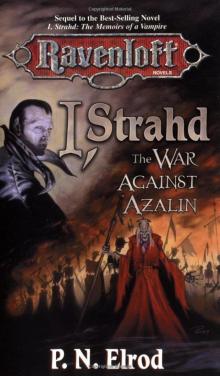 I, Strahd: The War Against Azalin
I, Strahd: The War Against Azalin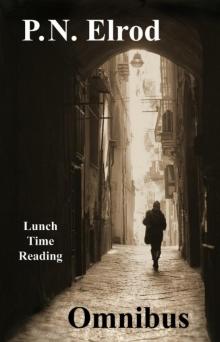 P N Elrod Omnibus
P N Elrod Omnibus Bloodlist
Bloodlist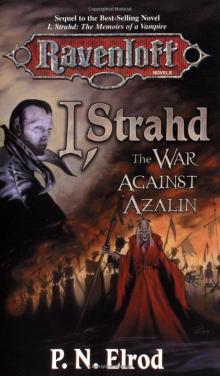 I, Strahd: The Memoirs of a Vampire
I, Strahd: The Memoirs of a Vampire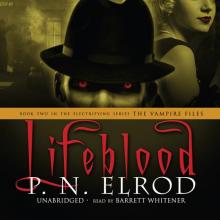 Lifeblood
Lifeblood Song in the Dark
Song in the Dark The Vampire Files, Volume One
The Vampire Files, Volume One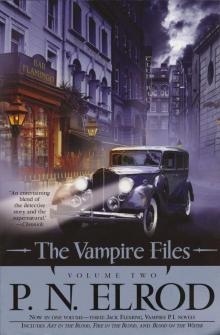 Fire In The Blood
Fire In The Blood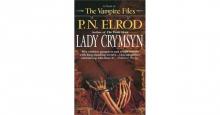 Lady Crymsyn
Lady Crymsyn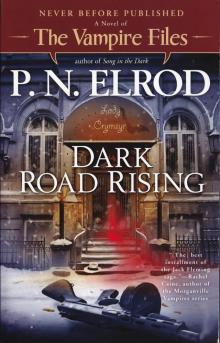 Dark Road Rising
Dark Road Rising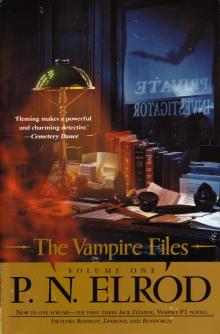 The Adventures of Myhr
The Adventures of Myhr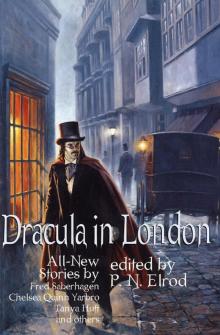 Dracula_in_London
Dracula_in_London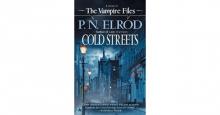 Cold Streets
Cold Streets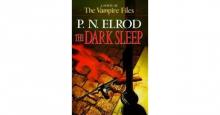 The Dark Sleep
The Dark Sleep The Vampire Files, Volume Two
The Vampire Files, Volume Two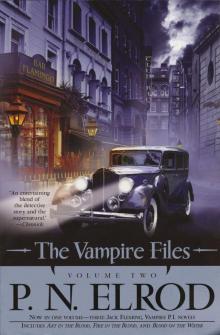 Blood on the Water
Blood on the Water The Vampire Files Anthology
The Vampire Files Anthology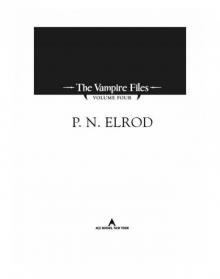 The Vampire Files, Volume Four
The Vampire Files, Volume Four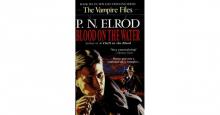 A Chill In The Blood
A Chill In The Blood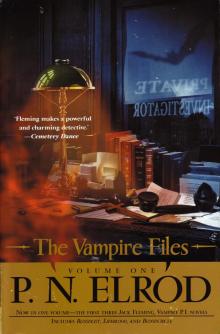 Bloodcircle
Bloodcircle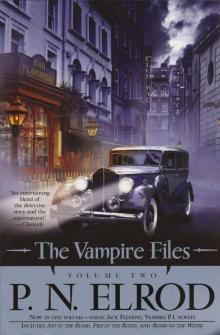 Art In The Blood
Art In The Blood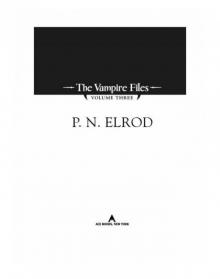 The Vampire Files, Volume Three
The Vampire Files, Volume Three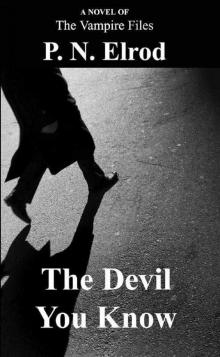 The Devil You Know
The Devil You Know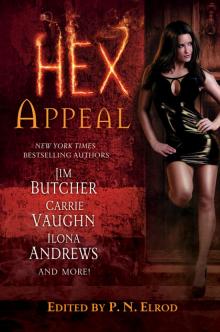 Hex Appeal
Hex Appeal Jonathan Barrett Gentleman Vampire
Jonathan Barrett Gentleman Vampire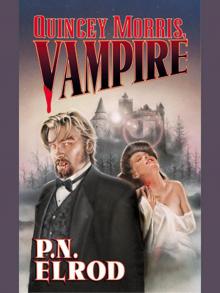 Quincey Morris, Vampire
Quincey Morris, Vampire Strange Brew
Strange Brew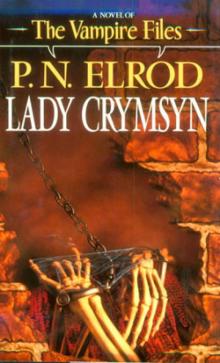 Lady Crymsy
Lady Crymsy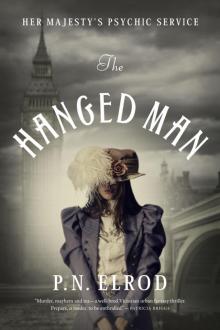 The Hanged Man
The Hanged Man